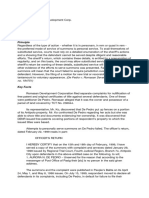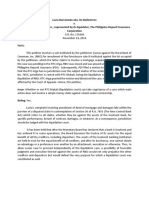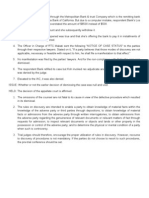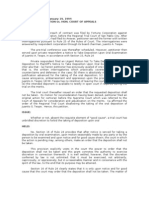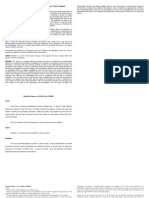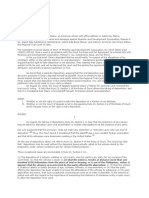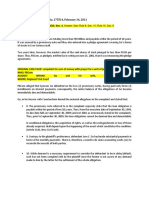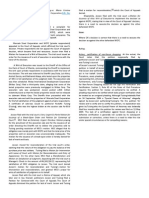Villamor Vs Salas
Villamor Vs Salas
Uploaded by
lucci_1182Copyright:
Available Formats
Villamor Vs Salas
Villamor Vs Salas
Uploaded by
lucci_1182Original Description:
Original Title
Copyright
Available Formats
Share this document
Did you find this document useful?
Is this content inappropriate?
Copyright:
Available Formats
Villamor Vs Salas
Villamor Vs Salas
Uploaded by
lucci_1182Copyright:
Available Formats
VILLAMOR vs. SALAS G.R. No. 101041 November 13, 1991 203 SCRA 450 GRIO-AQUINO, J.
: Facts: Carlos filed an administrative case against Judge Villamor, charging him with having issued illegal orders and an unjust decision in a case he was a party of regarding a dispute on ownership and possession of a certain parcel of land against Naval. The same was summarily dismissed by the Supreme Court. Dissatisfied, Carlos filed a civil action for damages against Judge Villamor for knowingly rendering an unjust judgment when he dismissed five criminal cases against Naval and the same was raffled to the RTC presided by Judge Salas. Meanwhile, Attorney Guerrero's complaint for damages was raffled to Branch 21, Regional Trial Court, Cebu City wherein Judge Aleonar took cognizance of the same. Issue: Whether or not Judges Aleonar and Salas may take cognizance of the actions for damages against Judge Villamor for allegedly having rendered an unjust order against Carlos and Attorney Guerrero which the Supreme Court subsequently annulled Held: No. No Regional Trial Court can pass upon and scrutinize, and much less declare as unjust a judgment of another Regional Trial Court and sentence the judge thereof liable for damages without running afoul with the principle that only the higher appellate courts, namely, the Court of Appeals and the Supreme Court, are vested with authority to review and correct errors of the trial courts. To allow respondent Judges Aleonar and Salas to proceed with the trial of the actions for damages against the petitioner, a co-equal judge of a co-equal court, would in effect permit a court to review and interfere with the judgment of a co-equal court over which it has no appellate jurisdiction or power of review. The various branches of a Court of First Instance (now the Regional Trial Court) being co-equal, may not interfere with each other's cases, judgments and orders. Only after the Appellate Court, in a final judgment, has found that a trial judge's errors were committed deliberately and in bad faith may a charge of knowingly rendering an unjust decision be leveled against the latter.
You might also like
- De Pedro V Romasan Development Corp.Document4 pagesDe Pedro V Romasan Development Corp.Eliza Fe Rojas100% (2)
- Bustos vs. LuceroDocument2 pagesBustos vs. LuceroJoseph Macalintal100% (11)
- Page 31 - Inchausti vs. de Leon (#57)Document2 pagesPage 31 - Inchausti vs. de Leon (#57)danielNo ratings yet
- Zuniga-Santos Vs Santos-GranDocument2 pagesZuniga-Santos Vs Santos-Granana ortizNo ratings yet
- Manchester Development Corporation Vs CADocument3 pagesManchester Development Corporation Vs CAUE Law100% (1)
- 5 Jose Vs JavellanaDocument4 pages5 Jose Vs JavellanaRENGIE GALO100% (2)
- 55 Ayala Land v. TagleDocument2 pages55 Ayala Land v. TagleRem Serrano100% (1)
- 12 Guerrero V VillamorDocument3 pages12 Guerrero V VillamorJudy Ann ShengNo ratings yet
- Pag-Ibig - Members Change of InfoDocument2 pagesPag-Ibig - Members Change of Infolucci_1182No ratings yet
- Pagibig Member's Data Form (MDF)Document2 pagesPagibig Member's Data Form (MDF)wawawiwap72% (74)
- Pagibig Member's Data Form (MDF)Document2 pagesPagibig Member's Data Form (MDF)wawawiwap72% (74)
- Villamor v. SalasDocument2 pagesVillamor v. SalasAireeNo ratings yet
- Fortune Corporation vs. CADocument1 pageFortune Corporation vs. CAJonathan Bacus100% (2)
- Rule 44 - Crispino v. Tansay - ManaloARHSRYJNDocument3 pagesRule 44 - Crispino v. Tansay - ManaloARHSRYJNFLOYD MORPHEUSNo ratings yet
- Lucia Barrameda v. Rural Bank Case DigestDocument1 pageLucia Barrameda v. Rural Bank Case DigestCheCheNo ratings yet
- Ang v. Ang (Digest)Document2 pagesAng v. Ang (Digest)Tini Guanio83% (6)
- Koh Vs IACDocument1 pageKoh Vs IACJL A H-DimaculanganNo ratings yet
- Sales v. Sabino - DigestDocument1 pageSales v. Sabino - DigestVanessaNo ratings yet
- ALLIED vs. CHERRY VALLEY G.R. No. 118438Document2 pagesALLIED vs. CHERRY VALLEY G.R. No. 118438Marianne Andres100% (1)
- Republic V G Holdings DigestDocument7 pagesRepublic V G Holdings DigestIvan Montealegre Conchas100% (2)
- Civpro Conso DigestsDocument37 pagesCivpro Conso DigestsGreta VilarNo ratings yet
- 10 Aurora N de Pedro V Romasan Development CorporationDocument5 pages10 Aurora N de Pedro V Romasan Development CorporationLance Christian Zoleta100% (1)
- BP Oil and Chemicals Intl Philippines, Inc Vs - Total Distribution Logistic Systems, IncDocument2 pagesBP Oil and Chemicals Intl Philippines, Inc Vs - Total Distribution Logistic Systems, IncReina Anne JaymeNo ratings yet
- NM Rothschild v. LepantoDocument3 pagesNM Rothschild v. Lepantooabeljeanmonique100% (1)
- Gochan V GochanDocument7 pagesGochan V GochanIvan Montealegre Conchas100% (2)
- Alba vs. MalapajoDocument2 pagesAlba vs. MalapajozaneNo ratings yet
- Galofa v. Nee Bon Sing - Defenses, Judgment On The PleadingsDocument2 pagesGalofa v. Nee Bon Sing - Defenses, Judgment On The PleadingsAtty. G100% (1)
- Chua Vs ToprosDocument1 pageChua Vs ToprosJL A H-DimaculanganNo ratings yet
- Davao Light vs. CA - CivProDocument2 pagesDavao Light vs. CA - CivProAmielle Canillo100% (1)
- Casent Realty Development Corp Vs PhilbankingDocument2 pagesCasent Realty Development Corp Vs PhilbankingVictor Lim100% (1)
- Aklan v. Jody KingDocument2 pagesAklan v. Jody KingPmb100% (1)
- Korea Exchange Bank v. Gonzales (456 Scra 224, 2005)Document2 pagesKorea Exchange Bank v. Gonzales (456 Scra 224, 2005)Athina Maricar CabaseNo ratings yet
- Heirs of Reinoso Vs CA-CivProDocument2 pagesHeirs of Reinoso Vs CA-CivProJepee Ramos100% (1)
- ALAG - Malonzo, Et Al. v. Sucere FoodsDocument5 pagesALAG - Malonzo, Et Al. v. Sucere FoodsMiguel AlagNo ratings yet
- Civpro CasesDocument6 pagesCivpro CaseslchieSNo ratings yet
- BRIBONERIA Vs CADocument2 pagesBRIBONERIA Vs CAJesse RazonNo ratings yet
- Swagman Hotels and Travel CaseDocument2 pagesSwagman Hotels and Travel CaseLUNA100% (2)
- Heirs of The Late Ruben Reinoso SR V CA DigestDocument1 pageHeirs of The Late Ruben Reinoso SR V CA Digestcookbooks&lawbooksNo ratings yet
- 28 Aznar v. BernadDocument1 page28 Aznar v. BernadNN DDLNo ratings yet
- Multinational Village Homeowners's Assoc. v. CADocument2 pagesMultinational Village Homeowners's Assoc. v. CAJan Maxine Palomata100% (1)
- Mangaliag Vs Catubig-PastoralDocument2 pagesMangaliag Vs Catubig-PastoralPauline LicaycayNo ratings yet
- Figueroa v. PeopleDocument1 pageFigueroa v. PeopleElaineMarcilla0% (1)
- Ejercito V VargasDocument3 pagesEjercito V VargasJaniceNo ratings yet
- PhilHealth V OLLH DigestDocument3 pagesPhilHealth V OLLH Digestkristinevillanueva100% (1)
- Casent Realty Vs Philbanking CorpDocument53 pagesCasent Realty Vs Philbanking CorpAthena AthenaNo ratings yet
- Case Digests Set 1Document19 pagesCase Digests Set 1Delsie FalculanNo ratings yet
- Veran VS CaDocument2 pagesVeran VS CaJesse RazonNo ratings yet
- De Joya V Marquez DigestDocument1 pageDe Joya V Marquez DigestLara Yulo100% (1)
- Digest - Cavile v. Heirs of Clarita CavileDocument2 pagesDigest - Cavile v. Heirs of Clarita CavileAleli Guinto100% (1)
- FIRST AQUA SUGAR TRADERS Vs BPIDocument1 pageFIRST AQUA SUGAR TRADERS Vs BPIArlene DurbanNo ratings yet
- Sansio v. Sps MogolDocument3 pagesSansio v. Sps Mogolkim_santos_20No ratings yet
- Delos Reyes v. RamnaniDocument2 pagesDelos Reyes v. RamnaniHenelsieBarrigaMendozaNo ratings yet
- Tonmarts-Mtg11 LCKvPlantersDocument2 pagesTonmarts-Mtg11 LCKvPlantersMarton Emile DesalesNo ratings yet
- Santamaria V ClearyDocument2 pagesSantamaria V ClearyJodi Anne Amoyo100% (1)
- Alba Vs CA, 465 Scra 495, DigestDocument3 pagesAlba Vs CA, 465 Scra 495, DigestKinitDelfinCelestialNo ratings yet
- Heide M. Estandarte vs. People of The PhilippinesDocument6 pagesHeide M. Estandarte vs. People of The PhilippinesGretchen Alunday Suarez100% (1)
- PBCom v. Spouses GoDocument7 pagesPBCom v. Spouses GoChase DaclanNo ratings yet
- Heirs of Bautista V Lindo DigestDocument1 pageHeirs of Bautista V Lindo DigestEvangeline VillajuanNo ratings yet
- 119 Monzon V Spouses RelovaDocument2 pages119 Monzon V Spouses RelovaRom100% (1)
- Tortal Vs TaniguchiDocument2 pagesTortal Vs TaniguchijovifactorNo ratings yet
- Villamor vs. SalasDocument1 pageVillamor vs. SalasnobocNo ratings yet
- Villamor v. Salas, G.R. No. 101041, November 13, 1991Document3 pagesVillamor v. Salas, G.R. No. 101041, November 13, 1991Kristine JoyNo ratings yet
- Petitioner vs. vs. Respondents: First DivisionDocument4 pagesPetitioner vs. vs. Respondents: First DivisionEunice NavarroNo ratings yet
- Ethel Grimm Roberts Vs Judge Tomas LeonidasDocument2 pagesEthel Grimm Roberts Vs Judge Tomas Leonidaslucci_1182No ratings yet
- Ethel Grimm Roberts Vs Judge Tomas LeonidasDocument2 pagesEthel Grimm Roberts Vs Judge Tomas Leonidaslucci_1182No ratings yet
- In Re Petition For Adoption of Michelle Lim and Michael LimDocument2 pagesIn Re Petition For Adoption of Michelle Lim and Michael Limlucci_1182No ratings yet
- Gempesaw Vs CADocument4 pagesGempesaw Vs CAlucci_1182100% (1)
- Wilson Sy vs. Court of Appeals and Mercedes T. Uy-Sy (Spec Pro)Document1 pageWilson Sy vs. Court of Appeals and Mercedes T. Uy-Sy (Spec Pro)lucci_1182No ratings yet
- Form For Loss Affidavit IdDocument1 pageForm For Loss Affidavit Idlucci_1182No ratings yet
- Suggestion For Respiratory DiseasesDocument3 pagesSuggestion For Respiratory Diseaseslucci_1182No ratings yet
- Ching Vs Sec of JusticeDocument5 pagesChing Vs Sec of Justicelucci_1182No ratings yet
- Argallon Jocson Vs MCFCDocument1 pageArgallon Jocson Vs MCFClucci_1182No ratings yet
- Form For Loss Affidavit IdDocument1 pageForm For Loss Affidavit Idlucci_1182No ratings yet
- Dela Cruz Vs CaDocument3 pagesDela Cruz Vs Calucci_1182100% (3)
- Paloma Vs MoraDocument2 pagesPaloma Vs Moralucci_1182No ratings yet
- Quesada Vs DOJDocument1 pageQuesada Vs DOJlucci_1182100% (1)
- Sta Clara Vs GastonDocument2 pagesSta Clara Vs Gastonlucci_1182No ratings yet
- Atty Abrenica Vs Law of Abrenica Tungol TingayanDocument1 pageAtty Abrenica Vs Law of Abrenica Tungol Tingayanlucci_1182No ratings yet
- Tijam Vs SibonghanoyDocument1 pageTijam Vs Sibonghanoylucci_1182No ratings yet
- Calimlim Vs Ramirez CIVPRO DigestDocument1 pageCalimlim Vs Ramirez CIVPRO Digestlucci_118250% (2)
